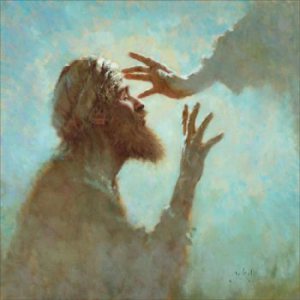“I just called to say I love you”, “you are the sunshine of my life”, “ebony and ivory”, “don’t you worry ‘bout a thing”. Do you know who wrote these songs? Yes, it was of course Stevie Wonder! This American song writer and record producer was blind from infancy, probably due to an excess of oxygen in his incubator. It did not stop him from having a great career. Louis Braille became blind by accidentally stabbing himself. He became an inventor and would help millions of blind people to be able to still read books and signs. Andrea Bocelli also had an accident making him blind, at the age of twelve. It did not stop him from becoming a great operatic pop singer. And so we could name many others, like Ray Charles, Jules de Korte and Dutch columnist Vincent Bijlo.
I really love Vincent Bijlo’s humor! Here are a few lines from this month’s column in UWV/perspectief: “I know a man who can see and who thinks he’s very ugly. I don’t think that is true. I cannot check it of course, but he doesn’t sound ugly. People who can see get the most crazy ideas. They all buy the same expensive clothes and then say ‘I’m wearing something very exclusive’. And so there are 2 million Dutch people walking around in the same exclusive clothes.” And so it goes on. Funny how a blind person can see right through some of our craziness.
There are blind writers, poets, athletes and even photographers, painters and sculptors. And why not? It is a sign of civilisation if everyone’s talents are used to the full. It’s a good thing when people with whatever handicap are valued even if they are a little less productive. At the very least those people are to be recognized as individuals in their own right, with needs and rights and contributions and views that matter. Moreover, anyone could develop a handicap. Many of us already have one.
Who of you doesn’t have glasses, a walking stick, an inhaler, a false hip, hearing aids or medication? Well, you’re just lucky! So let us treat those with a handicap with some (more) sensitivity. They have a hard time as it is, carving out a place for themselves in our competitive society. But they can enrich that society and teach us that what we have, is not to be taken for granted.
The story of Bartimaeus is found in Mark as well as Matthew and Luke. Only in Matthew  it is about two blind men. We don’t know much about Bartimaeus, the blind beggar, except that he was blind and a beggar, and he was sitting outside Jericho. Of course his disability had been around for ages and this is just one story. But here he is mentioned by name and he gets a face.
it is about two blind men. We don’t know much about Bartimaeus, the blind beggar, except that he was blind and a beggar, and he was sitting outside Jericho. Of course his disability had been around for ages and this is just one story. But here he is mentioned by name and he gets a face.
Bartimaeus was someone, a little like the refugees of today, who was tolerated at best, and only as long as he would not open his mouth.
For wanting something from life was considered ungrateful or unfitting. Did he not already receive alms? And do the refugees of today not already receive a place in an old prison and a daily allowance, which by the way some people claim is 5 times higher than it actually is? In both cases valuable resources were said to be “lost” that could have gone into “the economy”, which is just another word for “me”.
Bartimaeus is blind, but when Jesus comes along, he can see his opportunity. Not one or two, but many people don’t know how quickly to shut him up. We are not told whether they belonged to the disciples or to the other part of the crowd, but Luke tells us they were the ones who were walking in front of the crowd. And they were not very kind at first. Some interpreters say that they were afraid of making too much noise which might alarm the Romans and cause everyone one to be arrested.
I find that unlikely. It was probably more of a “that person doesn’t count” attitude.
And they assumed that Christ wouldn’t waste his healing powers on someone that ordinary either.
Now I don’t know what you would do if you were told off like this. Some people feel intimidated and withdraw. Others will see a confirmation of the inequality or injustice and speak up even more. This is what Bartimaeus did, and the story is told with approval. People have a right to be heard, even if they “just” seek to improve their own conditions. It is great if you can speak on behalf of an entire group, but that should not be a requirement for being taken seriously. It is never shameful to ask or even to shout for help, to look for healing, to admit inadequate vision or prospects.
Now Jesus, early in his ministry, had applied a prophecy of Isaiah to himself, saying “The Spirit of the Lord is on me, because he has anointed me to proclaim good news to the poor. He has sent me to proclaim freedom for the prisoners and recovery of sight for the blind, to set the oppressed free, to proclaim the favourable year of the Lord”. So he would have been very conscious when people who were already suffering, were made to suffer more because of neglect and contempt. And I am certain that He is still appalled when people already traumatized by war, are attacked in their asylum centres, whether it is by fellow refugees, or by xenophobic Europeans.
The thing is that Jesus was able to look at each person individually, whereas we so often judge a whole group. Jesus would listen before he gave an opinion or a solution. In this case he simply asked, ”what do you want me to do for you”? This gave the poor man a voice, a way to influence his own fate, to have a say in the matter.
What do we read when we read the prophecy of Isaiah, and what do we think when we think of gifts of the spirit? Do we connect them with freedom from oppression in all its forms? Do we connect them with healing or health care to those who cannot afford it?
Do we connect our religion to the favourable year of the Lord, in other ways to an unexpected generosity, to an abundance we didn’t suspect was there to share? Or do we still believe in the principle of shortage, which is always just around the corner, threatening to knock us over?
Here I must admit that the poor in our society have some reason to be afraid. But their real enemies are not the refugees, or the unemployed, or those of another religion. On the contrary, these all tend to be victims of the same unwillingness of the rich to share or to give employment. So we can only hope that these groups will not be set up against each other, as a distraction from the real problems in our society. Jesus had a much more radical interpretation of the book of Isaiah than the scribes of his day, so we will also be more than justified if we firmly stand on the side of all the poor and under-privileged.
Before Jesus could have a normal conversation with Bartimaeus, the man had to come nearer. And isn’t it amazing how the attitude of the followers of Jesus changes? They now actually encourage Bartimaeus, saying “Take heart, get up, he is calling you”. A smile returned to Bartimaeus’ face. The challenge of course, is to treat people lovingly even when not explicitly ordered by some authority to do so. I understand that in the US it is the other way around and in some cases forbidden to feed the hungry. That is something that would clearly call for civil disobedience.
But we can often begin in a small way. Why not pay some unexpected attention to someone in your neighbourhood, perhaps even in this church, whom so far you haven’t noticed, or didn’t want to know, or made all kinds of assumptions about? Relinquish some of that power or pride or hesitation, and listen to the actual needs of people, and you will see they are just like yours. And when we give that kind of attention, people will leap up for joy, just like Bartimaeus did, for they can be themselves. No one needs to sit in the back row, hiding, except perhaps the sides man, who must be able to see if anyone needs help, for instance with our complicated liturgy, which we too get wrong sometimes.
But there is another layer of meaning in this story. Jesus was not only healing the blind beggar. He was at the same time healing those people who walked at the front of the crowd. He was healing their spiritual eyesight, which can also be missing or lost or diminished. Nowadays I think there is even a new kind of blindness, which is caused by too much information and detail, paradoxically causing us to take refuge in simplistic old world-views and harsh judgements.
Now I am not pointing this out to give you a gigantic guilt feeling, on the contrary.
Just as with physical blindness, people usually don’t choose to be spiritually blind or impaired. Often they don’t know what they are missing until something or someone opens their eyes. But when we feel that something is missing or unclear, let us not hesitate, but bring it before our Saviour in prayer. He invites us to throw off our mantle of self-pity and self-sufficiency (often two sides of the same coin). When he passes by, let Him open our eyes to our neighbour; heal our blind spots, short-sightedness and prejudice. So that we can admit our weaknesses and overreactions and not blame them on someone else.
Unfortunately we church people are not exactly immune to eye problems of this kind.
Amen.





Leave A Comment